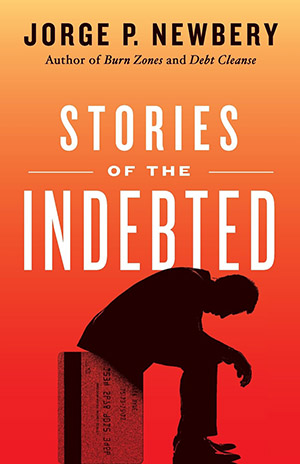Jorge P. Newbery’s Stories of the Indebted opens with the author speaking on a panel at a real estate crowdfunding conference. Newbery is asked then, and subsequently throughout his book, about how he settled a slew of debt, nearly six million dollar worth, for a fraction of that figure. What follows in Stories of the Indebted is a text dedicated to walking us through conversation after conversation about how the author has helped himself and others crush various debts.
[alert variation=”alert-info”]Publisher: Community Books
Formats: Paperback, eBook, Kindle, Audiobook
Purchase: Powell’s | Amazon | IndieBound | iBooks[/alert]
The book is broken up into 7 chapters each focusing on a specific debt issue. We travel with the author through various discussions. A talk on mortgage foreclosure occurs over coffee at Starbucks, a credit debit conversation at the Olive Garden, and a walkthrough how one could tackle student loans happens as a small group scarfs down sandwiches at Jerry’s Famous Deli in California. The author is a solid and descriptive writer. He paints the various scenes in vivid detail, pushing his narrative along, but at times this can be a distraction. We are forced to sort through a decent amount of narrative to get to what we want regarding the analysis and surrogate advice on debt.
Newbery’s tactic through his book is one that divests big corporations and business’, those who hold debt for the vast majority of citizens, of their power through pointed strategy. Stories of the Indebted is the story of how we as citizens can use the tangled web of bureaucracy to stall debts and in time overcome massive financial obstacles. The book is less of how-to and more of a series of conversation that we get to eavesdrop on. Many of Newbery’s musings and insights are helpful, but overall the text tends to drag, in part due to the lack of pointed advice. The individual cases here are informative, but when they start to veer from those of our direct concern they are hard to follow. Moving away and into the specifics for the characters in the book, that might be slightly different from ours, makes the act of reading Stories of the Indebted more an act of sorting. We spend a lot of time in this text looking for information and feel like it would all just be easier if we could get into one of these conversations with Newbery ourselves.
Stories of the Indebted is a quick and informative yet cursory read. The book comes off as if Michael Connelly’s Lincoln Lawyer was instead a debt consultant in the role of Newbery. We get started by Newbery, see how these things might work, but at the end are left wanting more. Newbery’s is an interesting book that leaves us without a clear path or plan other than to go to the author’s website and sign up to get started.
[signoff predefined=”Sponsored Review Program” icon=”book”][/signoff]

